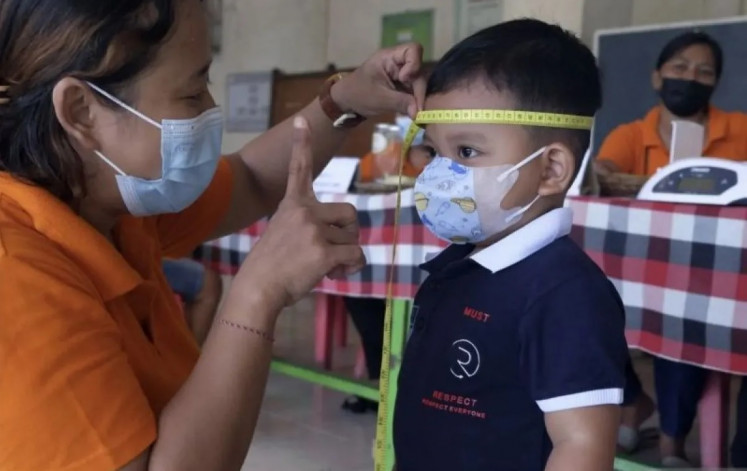Can we end tuberculosis in Indonesia by 2030?
Next year, it will be 50 years since the National TB Program began in Indonesia and 26 years after the World Health Organization (WHO) declared tuberculosis (TB) a global health emergency
Change text size
Gift Premium Articles
to Anyone

N
ext year, it will be 50 years since the National TB Program began in Indonesia and 26 years after the World Health Organization (WHO) declared tuberculosis (TB) a global health emergency.
Nonetheless, TB kills more than 4,400 people worldwide daily — more than malaria and HIV/AIDS combined. Despite free access to TB medications in the country, TB kills 300 Indonesians every day.
On Sept. 26, the United Nations will have its first high-level meeting on TB to establish a political declaration aimed to strengthen actions and investments to end the epidemic.
The government has already incorporated TB in the 2015 to 2019 National Medium-Term Development Plan (RPJMN) and orchestrated a multisectoral approach to end TB. Yet the government still needs to identify more domestic and private sources to boost the investment required to end TB.
In 2017, the TB budget was US$185 million; 29 percent of TB financing relies on domestic funds, 18 percent on international funding support and 53 percent is unfunded according to the WHO’s 2017 TB Country Profile.
This is alarming because funding is urgent to close the large gap on TB case-notification.
According to the 2017 WHO Global TB report, Indonesia has the second-highest incidence of TB globally, estimated at over 1 million annually and contributing to the 19 percent of “missing cases” (new TB cases that are undetected and not on treatment) worldwide.
A 2016 to 2017 inventory by the WHO and the National Institute of Health Research and Development in Indonesia suggested these missing cases are due to under reporting in health facilities, as well as geographical and financial barriers to reaching them.
Such cases must be identified because one untreated active TB case will infect 10 to 15 other people within a year. Among those infected, 5 to 10 percent will develop active TB. The failure to find the missing cases will risk losing all the gains made from decades of investment in TB control.
More funding from various stakeholders is necessary to improve diagnosis, treatment and prevention, as well as to accelerate the development of innovative tools, improve TB response to be more equitable and patient-centered, and to sustain leadership commitment to TB. Lives not saved due to lack of innovation in ensuring testing and treatment are patient-centered not only violates people’s rights to health but poses a significant economic threat.
Last year’s “Global economic impact of TB” report by Results UK with the KPMG auditing company highlighted the impact of TB deaths on our economy. TB deaths between 2000 and 2015 caused a loss of $ 616 billion to the world economy.
Indonesia suffered the second-largest loss of gross domestic product (GDP) due to TB-related mortality in 2000 to 2015, around $60 billion in 2016.
The report added that countries will continue to suffer larger GDP losses even though mortality is estimated to gradually decline at 3 percent each year between 2015 and 2030.
The estimated accumulative GDP loss incurred by Indonesia due to TB deaths in 2015 to 2030 will surpass $100 billion. According to the National Data and Information Center, in 2017, 75 percent of Indonesia’s active TB cases were of the productive age group. If the funding gap and innovation in TB prevention and control is not closed, 180 million Indonesians from the productive age group will risk developing active tuberculosis.
Furthermore, according to the Communications and Information Ministry, almost 70 percent of Indonesians will live in urban areas with higher risk of TB infection by 2045.
In acknowledging that Indonesia is facing a TB epidemic, we should expect more TB cases and deaths, and therefore, larger economic losses if we do not solve this problem with evidence-based firm actions, higher investments and better program accountability.
PricewaterhouseCoopers (PWC) predicted that Indonesia would be the fifth-largest world economy by 2030. However, a health crisis is looming that will halt Indonesia’s growth, especially with the increasing resistant forms of tuberculosis worldwide. This airborne disease infects anyone and across borders at a rate much faster than what it took for the global community to find more efficient TB drugs.
TB is still a long way from eradication, and ending TB is a challenging goal to achieve. On Sept. 26, heads of states will meet in New York in the United States for the UN General Assembly to strengthen the global response against the TB pandemic.
This meeting is a rare opportunity. There have been only four other health topics discussed in the UN General Assembly: HIV in 2001, non-communicable diseases in 2011, Ebola in 2014 and antimicrobacterial resistance in 2015.
This signifies how important and urgent it is for the global community and Indonesia to end TB by 2030, as agreed under the sustainable development goals.
Participation in the above UN forum will position Indonesia on the faster track to end TB and its effects will affect Indonesia’s economic growth. A political declaration about TB endorsed by Indonesia’s head of state at the UN forum will also demonstrate that TB is everybody’s business. This momentum will elucidate that investment in fighting against TB is not only the government’s responsibility, or that TB is only commemorated on World TB Day. Tuberculosis intersects with the economy and global security. It is only with continuous cross-sectoral collaborations all year long that we can leave a legacy for future generations, a world where nobody suffers from tuberculosis.
If a nation with the second-highest TB burden can step up to this commitment, there are no reasons for other developing nations not to do the same.
Conversely, securing commitment at the highest political level will lead to more decisive actions and impactful investments that can support TB acceleration efforts by the government and all its partners.
_____________________________
The writer is a project communication officer at Center for Indonesia’s Strategic Development Initiatives (CISDI) working with Forum Stop Tuberculosis Partnership Indonesia (FSTPI). She is a development practitioner passionate about health equity and the fight against TB with an intersectional approach. The views expressed are her own.









